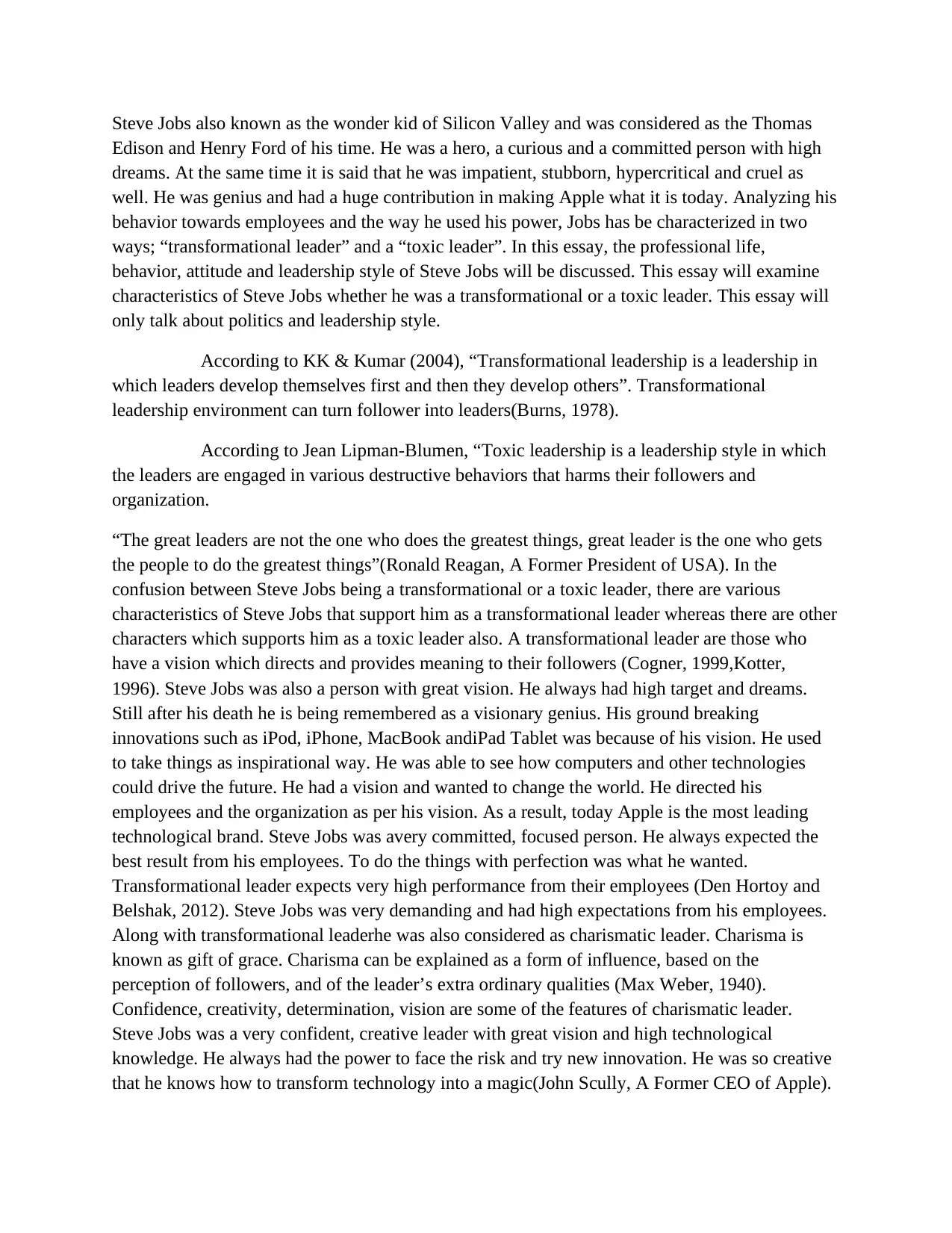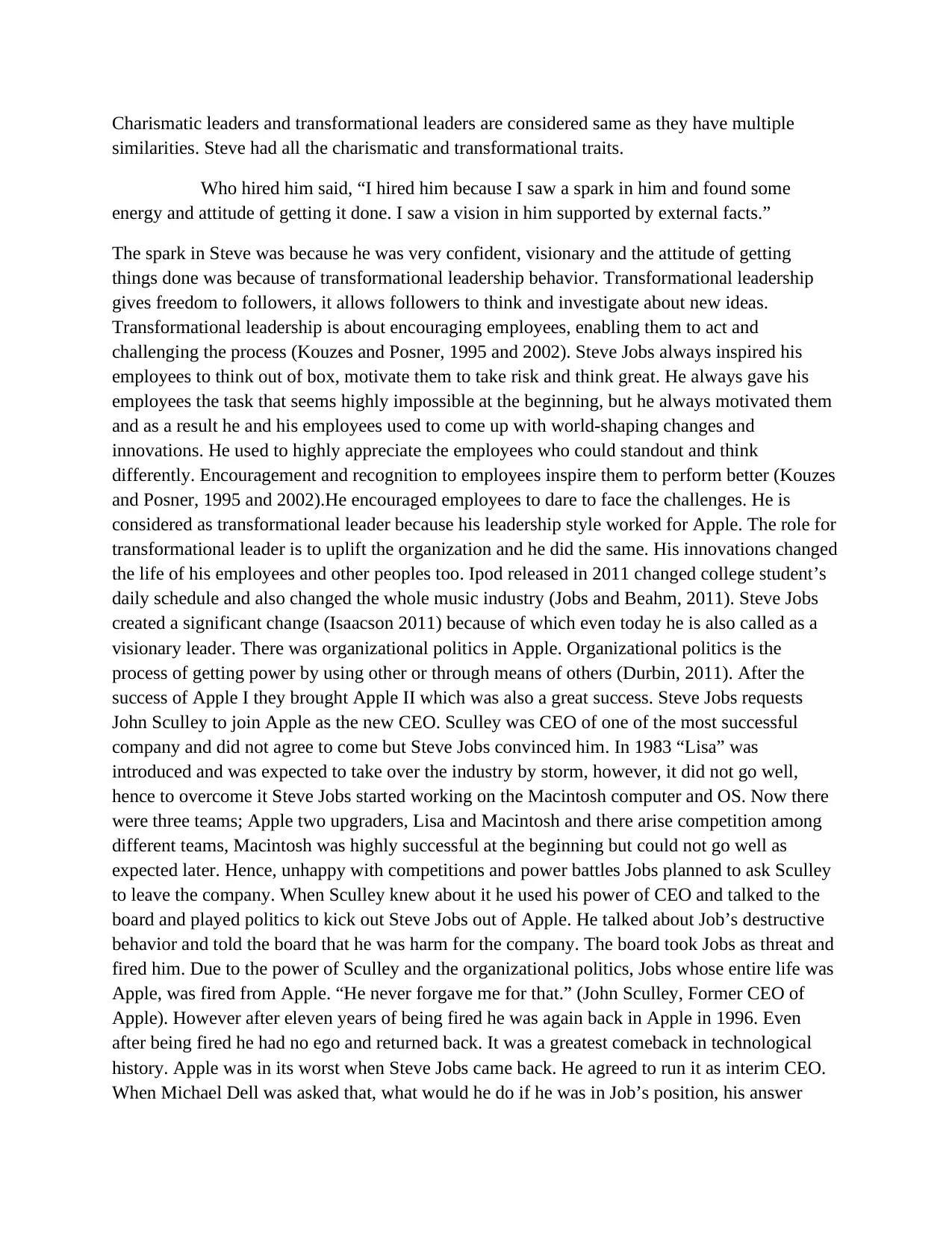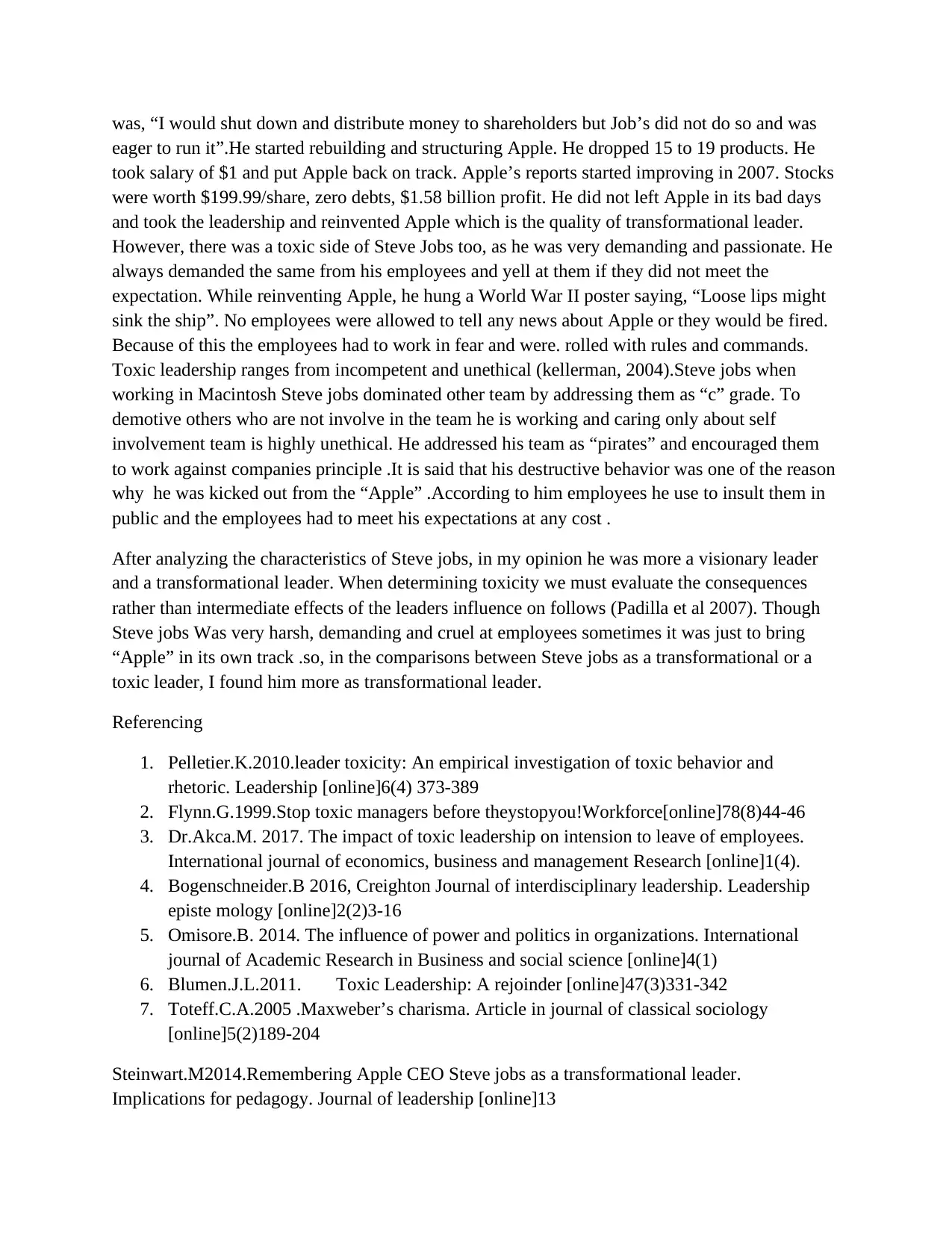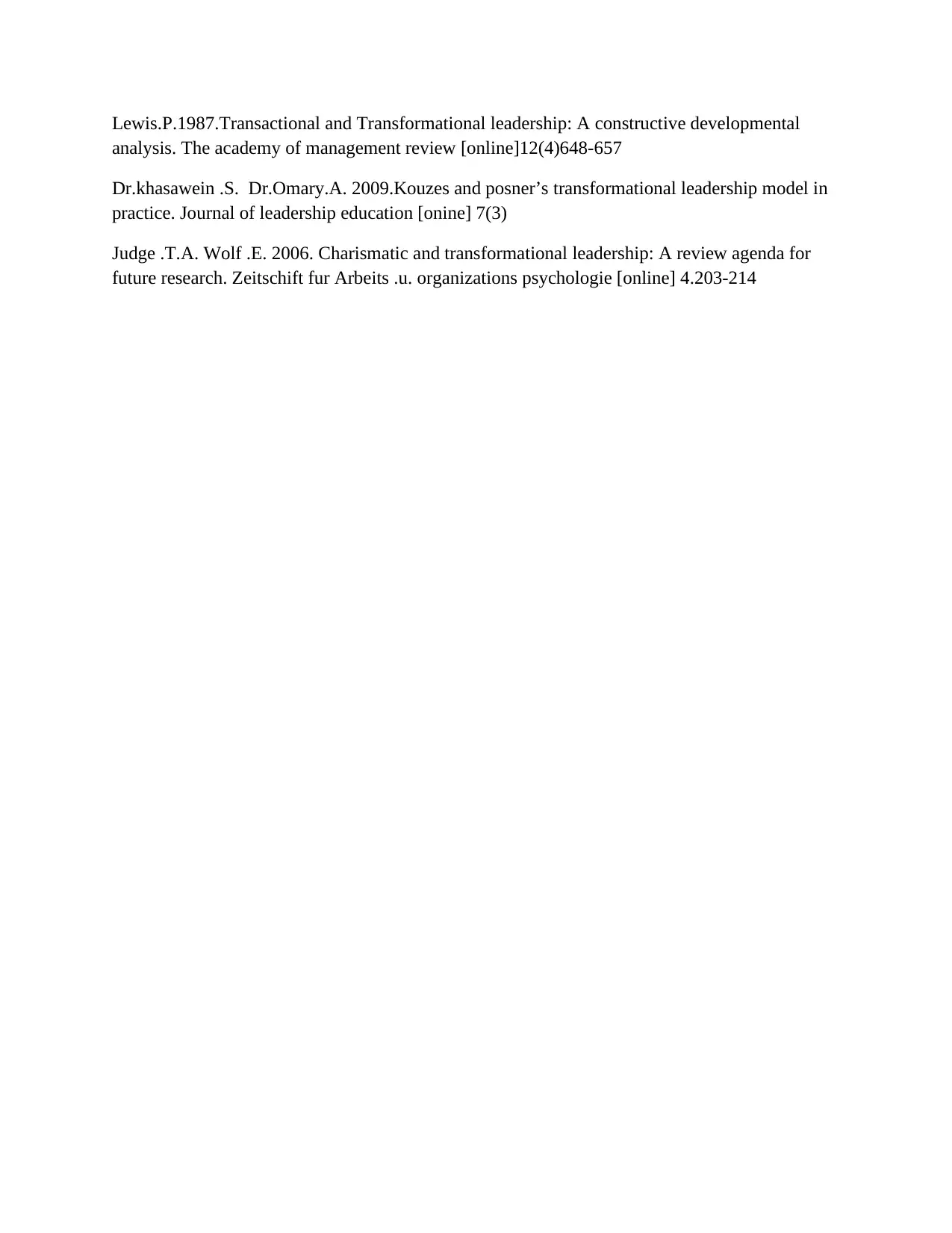Analyzing Steve Jobs' Leadership: Transformational or Toxic?
VerifiedAdded on 2020/11/30
|4
|1995
|181
Essay
AI Summary
This essay provides a comprehensive analysis of Steve Jobs' leadership style, examining whether he exhibited transformational or toxic leadership qualities. It delves into his vision, commitment, and demanding nature, exploring his impact on Apple and his employees. The essay discusses his charismatic traits, visionary innovations, and the organizational politics within Apple that led to his temporary ousting. It also highlights his return to Apple and his efforts to rebuild the company. The analysis considers both the positive aspects of his transformational leadership and the negative aspects of his demanding and sometimes harsh behavior, ultimately concluding that, while exhibiting some toxic traits, Steve Jobs' leadership was predominantly transformational, driven by his vision and commitment to innovation. The essay references multiple academic sources to support its arguments.

Steve Jobs also known as the wonder kid of Silicon Valley and was considered as the Thomas
Edison and Henry Ford of his time. He was a hero, a curious and a committed person with high
dreams. At the same time it is said that he was impatient, stubborn, hypercritical and cruel as
well. He was genius and had a huge contribution in making Apple what it is today. Analyzing his
behavior towards employees and the way he used his power, Jobs has be characterized in two
ways; “transformational leader” and a “toxic leader”. In this essay, the professional life,
behavior, attitude and leadership style of Steve Jobs will be discussed. This essay will examine
characteristics of Steve Jobs whether he was a transformational or a toxic leader. This essay will
only talk about politics and leadership style.
According to KK & Kumar (2004), “Transformational leadership is a leadership in
which leaders develop themselves first and then they develop others”. Transformational
leadership environment can turn follower into leaders(Burns, 1978).
According to Jean Lipman-Blumen, “Toxic leadership is a leadership style in which
the leaders are engaged in various destructive behaviors that harms their followers and
organization.
“The great leaders are not the one who does the greatest things, great leader is the one who gets
the people to do the greatest things”(Ronald Reagan, A Former President of USA). In the
confusion between Steve Jobs being a transformational or a toxic leader, there are various
characteristics of Steve Jobs that support him as a transformational leader whereas there are other
characters which supports him as a toxic leader also. A transformational leader are those who
have a vision which directs and provides meaning to their followers (Cogner, 1999,Kotter,
1996). Steve Jobs was also a person with great vision. He always had high target and dreams.
Still after his death he is being remembered as a visionary genius. His ground breaking
innovations such as iPod, iPhone, MacBook andiPad Tablet was because of his vision. He used
to take things as inspirational way. He was able to see how computers and other technologies
could drive the future. He had a vision and wanted to change the world. He directed his
employees and the organization as per his vision. As a result, today Apple is the most leading
technological brand. Steve Jobs was avery committed, focused person. He always expected the
best result from his employees. To do the things with perfection was what he wanted.
Transformational leader expects very high performance from their employees (Den Hortoy and
Belshak, 2012). Steve Jobs was very demanding and had high expectations from his employees.
Along with transformational leaderhe was also considered as charismatic leader. Charisma is
known as gift of grace. Charisma can be explained as a form of influence, based on the
perception of followers, and of the leader’s extra ordinary qualities (Max Weber, 1940).
Confidence, creativity, determination, vision are some of the features of charismatic leader.
Steve Jobs was a very confident, creative leader with great vision and high technological
knowledge. He always had the power to face the risk and try new innovation. He was so creative
that he knows how to transform technology into a magic(John Scully, A Former CEO of Apple).
Edison and Henry Ford of his time. He was a hero, a curious and a committed person with high
dreams. At the same time it is said that he was impatient, stubborn, hypercritical and cruel as
well. He was genius and had a huge contribution in making Apple what it is today. Analyzing his
behavior towards employees and the way he used his power, Jobs has be characterized in two
ways; “transformational leader” and a “toxic leader”. In this essay, the professional life,
behavior, attitude and leadership style of Steve Jobs will be discussed. This essay will examine
characteristics of Steve Jobs whether he was a transformational or a toxic leader. This essay will
only talk about politics and leadership style.
According to KK & Kumar (2004), “Transformational leadership is a leadership in
which leaders develop themselves first and then they develop others”. Transformational
leadership environment can turn follower into leaders(Burns, 1978).
According to Jean Lipman-Blumen, “Toxic leadership is a leadership style in which
the leaders are engaged in various destructive behaviors that harms their followers and
organization.
“The great leaders are not the one who does the greatest things, great leader is the one who gets
the people to do the greatest things”(Ronald Reagan, A Former President of USA). In the
confusion between Steve Jobs being a transformational or a toxic leader, there are various
characteristics of Steve Jobs that support him as a transformational leader whereas there are other
characters which supports him as a toxic leader also. A transformational leader are those who
have a vision which directs and provides meaning to their followers (Cogner, 1999,Kotter,
1996). Steve Jobs was also a person with great vision. He always had high target and dreams.
Still after his death he is being remembered as a visionary genius. His ground breaking
innovations such as iPod, iPhone, MacBook andiPad Tablet was because of his vision. He used
to take things as inspirational way. He was able to see how computers and other technologies
could drive the future. He had a vision and wanted to change the world. He directed his
employees and the organization as per his vision. As a result, today Apple is the most leading
technological brand. Steve Jobs was avery committed, focused person. He always expected the
best result from his employees. To do the things with perfection was what he wanted.
Transformational leader expects very high performance from their employees (Den Hortoy and
Belshak, 2012). Steve Jobs was very demanding and had high expectations from his employees.
Along with transformational leaderhe was also considered as charismatic leader. Charisma is
known as gift of grace. Charisma can be explained as a form of influence, based on the
perception of followers, and of the leader’s extra ordinary qualities (Max Weber, 1940).
Confidence, creativity, determination, vision are some of the features of charismatic leader.
Steve Jobs was a very confident, creative leader with great vision and high technological
knowledge. He always had the power to face the risk and try new innovation. He was so creative
that he knows how to transform technology into a magic(John Scully, A Former CEO of Apple).
Paraphrase This Document
Need a fresh take? Get an instant paraphrase of this document with our AI Paraphraser

Charismatic leaders and transformational leaders are considered same as they have multiple
similarities. Steve had all the charismatic and transformational traits.
Who hired him said, “I hired him because I saw a spark in him and found some
energy and attitude of getting it done. I saw a vision in him supported by external facts.”
The spark in Steve was because he was very confident, visionary and the attitude of getting
things done was because of transformational leadership behavior. Transformational leadership
gives freedom to followers, it allows followers to think and investigate about new ideas.
Transformational leadership is about encouraging employees, enabling them to act and
challenging the process (Kouzes and Posner, 1995 and 2002). Steve Jobs always inspired his
employees to think out of box, motivate them to take risk and think great. He always gave his
employees the task that seems highly impossible at the beginning, but he always motivated them
and as a result he and his employees used to come up with world-shaping changes and
innovations. He used to highly appreciate the employees who could standout and think
differently. Encouragement and recognition to employees inspire them to perform better (Kouzes
and Posner, 1995 and 2002).He encouraged employees to dare to face the challenges. He is
considered as transformational leader because his leadership style worked for Apple. The role for
transformational leader is to uplift the organization and he did the same. His innovations changed
the life of his employees and other peoples too. Ipod released in 2011 changed college student’s
daily schedule and also changed the whole music industry (Jobs and Beahm, 2011). Steve Jobs
created a significant change (Isaacson 2011) because of which even today he is also called as a
visionary leader. There was organizational politics in Apple. Organizational politics is the
process of getting power by using other or through means of others (Durbin, 2011). After the
success of Apple I they brought Apple II which was also a great success. Steve Jobs requests
John Sculley to join Apple as the new CEO. Sculley was CEO of one of the most successful
company and did not agree to come but Steve Jobs convinced him. In 1983 “Lisa” was
introduced and was expected to take over the industry by storm, however, it did not go well,
hence to overcome it Steve Jobs started working on the Macintosh computer and OS. Now there
were three teams; Apple two upgraders, Lisa and Macintosh and there arise competition among
different teams, Macintosh was highly successful at the beginning but could not go well as
expected later. Hence, unhappy with competitions and power battles Jobs planned to ask Sculley
to leave the company. When Sculley knew about it he used his power of CEO and talked to the
board and played politics to kick out Steve Jobs out of Apple. He talked about Job’s destructive
behavior and told the board that he was harm for the company. The board took Jobs as threat and
fired him. Due to the power of Sculley and the organizational politics, Jobs whose entire life was
Apple, was fired from Apple. “He never forgave me for that.” (John Sculley, Former CEO of
Apple). However after eleven years of being fired he was again back in Apple in 1996. Even
after being fired he had no ego and returned back. It was a greatest comeback in technological
history. Apple was in its worst when Steve Jobs came back. He agreed to run it as interim CEO.
When Michael Dell was asked that, what would he do if he was in Job’s position, his answer
similarities. Steve had all the charismatic and transformational traits.
Who hired him said, “I hired him because I saw a spark in him and found some
energy and attitude of getting it done. I saw a vision in him supported by external facts.”
The spark in Steve was because he was very confident, visionary and the attitude of getting
things done was because of transformational leadership behavior. Transformational leadership
gives freedom to followers, it allows followers to think and investigate about new ideas.
Transformational leadership is about encouraging employees, enabling them to act and
challenging the process (Kouzes and Posner, 1995 and 2002). Steve Jobs always inspired his
employees to think out of box, motivate them to take risk and think great. He always gave his
employees the task that seems highly impossible at the beginning, but he always motivated them
and as a result he and his employees used to come up with world-shaping changes and
innovations. He used to highly appreciate the employees who could standout and think
differently. Encouragement and recognition to employees inspire them to perform better (Kouzes
and Posner, 1995 and 2002).He encouraged employees to dare to face the challenges. He is
considered as transformational leader because his leadership style worked for Apple. The role for
transformational leader is to uplift the organization and he did the same. His innovations changed
the life of his employees and other peoples too. Ipod released in 2011 changed college student’s
daily schedule and also changed the whole music industry (Jobs and Beahm, 2011). Steve Jobs
created a significant change (Isaacson 2011) because of which even today he is also called as a
visionary leader. There was organizational politics in Apple. Organizational politics is the
process of getting power by using other or through means of others (Durbin, 2011). After the
success of Apple I they brought Apple II which was also a great success. Steve Jobs requests
John Sculley to join Apple as the new CEO. Sculley was CEO of one of the most successful
company and did not agree to come but Steve Jobs convinced him. In 1983 “Lisa” was
introduced and was expected to take over the industry by storm, however, it did not go well,
hence to overcome it Steve Jobs started working on the Macintosh computer and OS. Now there
were three teams; Apple two upgraders, Lisa and Macintosh and there arise competition among
different teams, Macintosh was highly successful at the beginning but could not go well as
expected later. Hence, unhappy with competitions and power battles Jobs planned to ask Sculley
to leave the company. When Sculley knew about it he used his power of CEO and talked to the
board and played politics to kick out Steve Jobs out of Apple. He talked about Job’s destructive
behavior and told the board that he was harm for the company. The board took Jobs as threat and
fired him. Due to the power of Sculley and the organizational politics, Jobs whose entire life was
Apple, was fired from Apple. “He never forgave me for that.” (John Sculley, Former CEO of
Apple). However after eleven years of being fired he was again back in Apple in 1996. Even
after being fired he had no ego and returned back. It was a greatest comeback in technological
history. Apple was in its worst when Steve Jobs came back. He agreed to run it as interim CEO.
When Michael Dell was asked that, what would he do if he was in Job’s position, his answer

was, “I would shut down and distribute money to shareholders but Job’s did not do so and was
eager to run it”.He started rebuilding and structuring Apple. He dropped 15 to 19 products. He
took salary of $1 and put Apple back on track. Apple’s reports started improving in 2007. Stocks
were worth $199.99/share, zero debts, $1.58 billion profit. He did not left Apple in its bad days
and took the leadership and reinvented Apple which is the quality of transformational leader.
However, there was a toxic side of Steve Jobs too, as he was very demanding and passionate. He
always demanded the same from his employees and yell at them if they did not meet the
expectation. While reinventing Apple, he hung a World War II poster saying, “Loose lips might
sink the ship”. No employees were allowed to tell any news about Apple or they would be fired.
Because of this the employees had to work in fear and were. rolled with rules and commands.
Toxic leadership ranges from incompetent and unethical (kellerman, 2004).Steve jobs when
working in Macintosh Steve jobs dominated other team by addressing them as “c” grade. To
demotive others who are not involve in the team he is working and caring only about self
involvement team is highly unethical. He addressed his team as “pirates” and encouraged them
to work against companies principle .It is said that his destructive behavior was one of the reason
why he was kicked out from the “Apple” .According to him employees he use to insult them in
public and the employees had to meet his expectations at any cost .
After analyzing the characteristics of Steve jobs, in my opinion he was more a visionary leader
and a transformational leader. When determining toxicity we must evaluate the consequences
rather than intermediate effects of the leaders influence on follows (Padilla et al 2007). Though
Steve jobs Was very harsh, demanding and cruel at employees sometimes it was just to bring
“Apple” in its own track .so, in the comparisons between Steve jobs as a transformational or a
toxic leader, I found him more as transformational leader.
Referencing
1. Pelletier.K.2010.leader toxicity: An empirical investigation of toxic behavior and
rhetoric. Leadership [online]6(4) 373-389
2. Flynn.G.1999.Stop toxic managers before theystopyou!Workforce[online]78(8)44-46
3. Dr.Akca.M. 2017. The impact of toxic leadership on intension to leave of employees.
International journal of economics, business and management Research [online]1(4).
4. Bogenschneider.B 2016, Creighton Journal of interdisciplinary leadership. Leadership
episte mology [online]2(2)3-16
5. Omisore.B. 2014. The influence of power and politics in organizations. International
journal of Academic Research in Business and social science [online]4(1)
6. Blumen.J.L.2011. Toxic Leadership: A rejoinder [online]47(3)331-342
7. Toteff.C.A.2005 .Maxweber’s charisma. Article in journal of classical sociology
[online]5(2)189-204
Steinwart.M2014.Remembering Apple CEO Steve jobs as a transformational leader.
Implications for pedagogy. Journal of leadership [online]13
eager to run it”.He started rebuilding and structuring Apple. He dropped 15 to 19 products. He
took salary of $1 and put Apple back on track. Apple’s reports started improving in 2007. Stocks
were worth $199.99/share, zero debts, $1.58 billion profit. He did not left Apple in its bad days
and took the leadership and reinvented Apple which is the quality of transformational leader.
However, there was a toxic side of Steve Jobs too, as he was very demanding and passionate. He
always demanded the same from his employees and yell at them if they did not meet the
expectation. While reinventing Apple, he hung a World War II poster saying, “Loose lips might
sink the ship”. No employees were allowed to tell any news about Apple or they would be fired.
Because of this the employees had to work in fear and were. rolled with rules and commands.
Toxic leadership ranges from incompetent and unethical (kellerman, 2004).Steve jobs when
working in Macintosh Steve jobs dominated other team by addressing them as “c” grade. To
demotive others who are not involve in the team he is working and caring only about self
involvement team is highly unethical. He addressed his team as “pirates” and encouraged them
to work against companies principle .It is said that his destructive behavior was one of the reason
why he was kicked out from the “Apple” .According to him employees he use to insult them in
public and the employees had to meet his expectations at any cost .
After analyzing the characteristics of Steve jobs, in my opinion he was more a visionary leader
and a transformational leader. When determining toxicity we must evaluate the consequences
rather than intermediate effects of the leaders influence on follows (Padilla et al 2007). Though
Steve jobs Was very harsh, demanding and cruel at employees sometimes it was just to bring
“Apple” in its own track .so, in the comparisons between Steve jobs as a transformational or a
toxic leader, I found him more as transformational leader.
Referencing
1. Pelletier.K.2010.leader toxicity: An empirical investigation of toxic behavior and
rhetoric. Leadership [online]6(4) 373-389
2. Flynn.G.1999.Stop toxic managers before theystopyou!Workforce[online]78(8)44-46
3. Dr.Akca.M. 2017. The impact of toxic leadership on intension to leave of employees.
International journal of economics, business and management Research [online]1(4).
4. Bogenschneider.B 2016, Creighton Journal of interdisciplinary leadership. Leadership
episte mology [online]2(2)3-16
5. Omisore.B. 2014. The influence of power and politics in organizations. International
journal of Academic Research in Business and social science [online]4(1)
6. Blumen.J.L.2011. Toxic Leadership: A rejoinder [online]47(3)331-342
7. Toteff.C.A.2005 .Maxweber’s charisma. Article in journal of classical sociology
[online]5(2)189-204
Steinwart.M2014.Remembering Apple CEO Steve jobs as a transformational leader.
Implications for pedagogy. Journal of leadership [online]13
⊘ This is a preview!⊘
Do you want full access?
Subscribe today to unlock all pages.

Trusted by 1+ million students worldwide

Lewis.P.1987.Transactional and Transformational leadership: A constructive developmental
analysis. The academy of management review [online]12(4)648-657
Dr.khasawein .S. Dr.Omary.A. 2009.Kouzes and posner’s transformational leadership model in
practice. Journal of leadership education [onine] 7(3)
Judge .T.A. Wolf .E. 2006. Charismatic and transformational leadership: A review agenda for
future research. Zeitschift fur Arbeits .u. organizations psychologie [online] 4.203-214
analysis. The academy of management review [online]12(4)648-657
Dr.khasawein .S. Dr.Omary.A. 2009.Kouzes and posner’s transformational leadership model in
practice. Journal of leadership education [onine] 7(3)
Judge .T.A. Wolf .E. 2006. Charismatic and transformational leadership: A review agenda for
future research. Zeitschift fur Arbeits .u. organizations psychologie [online] 4.203-214
1 out of 4
Related Documents
Your All-in-One AI-Powered Toolkit for Academic Success.
+13062052269
info@desklib.com
Available 24*7 on WhatsApp / Email
![[object Object]](/_next/static/media/star-bottom.7253800d.svg)
Unlock your academic potential
Copyright © 2020–2026 A2Z Services. All Rights Reserved. Developed and managed by ZUCOL.




